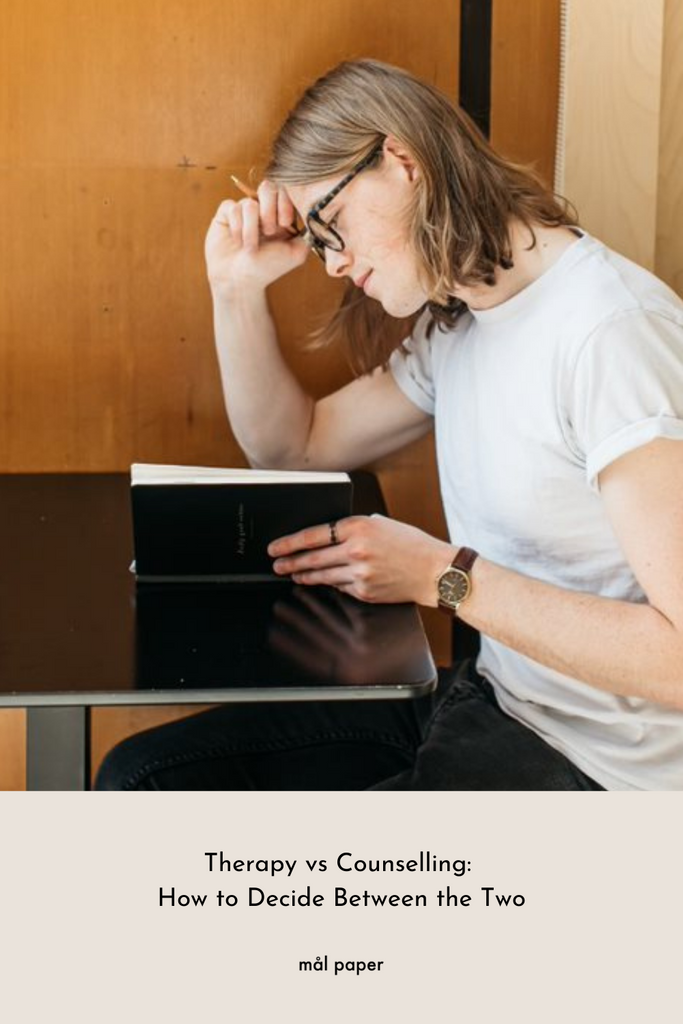Therapy vs Counselling: How to Decide Between the Two
Therapy. Counselling. You’d be forgiven for thinking they are the same thing, given how most people use these terms interchangeably. But in reality, the two practices have fairly different goals for their patients.
If you are in a rough spot and feel like you need professional help, you will probably be contemplating which of the two services to use.
In this post, we’re going to go through the fundamental differences between each and the factors you need to consider when making your decision between them. So therapy vs counselling, what is the difference?
What is Counselling?
Counselling is a tool to work out issues related to a particular situation or event. For example, someone that is having problems in their relationship might attend couples counselling. Someone having a one-off stressful assignment at work may seek counselling to help them get through the project without succumbing to the stress it causes.
As counselling is geared for such specific events, the information and work you take away from it won’t always be easily applicable to other areas of your life.
What is Therapy?
Therapy is a practice used to investigate the problems of the individual as a whole. More specifically, how we deal with our emotions, thoughts, and actions and their role in our lives. It might also consider our past in order to understand how we process our feelings today.
As a consequence, therapy works to prepare you to deal with most situations in life by giving you a core understanding of yourself and a framework that can be used in many circumstances.

Four questions to ask yourself to help you decide between therapy and counselling
Now that you know the difference between the two forms of help, what questions will help you make the decision?
-
Why am I seeking professional help?
The first step to deciding between therapy and counselling is to try and nail down the reason you feel you need help in the first place.
Is there a specific isolated situation you are having trouble dealing with? Do you feel that the issue comes from the event and has not branched out into other parts of your life (or at least not enough to cause an adverse effect)? If so, counselling may be the path for you.
On the other hand, if you are seeking help for anxiety, depression, mood issues, or any other issue that has an overarching effect on your life, therapy is more likely to be a better solution for you.
-
What do I want out of my sessions?
Counselling tends to be more talk-heavy, whereas therapy tends to be more geared to learning how to take action. However, there are therapies that predominantly rely on talking (talking therapies).
So, if you feel that you want a space to share your feelings on a specific topic in order to find a resolution, counselling is a good option for you.
However, if you would rather not focus on talking too much about your feelings and instead focus on learning how you can understand your emotions better so you can learn to thrive in a variety of situations, therapy such as Cognitive Behavioural Therapy (CBT) would be a great solution for you.
-
Do I want a long term or short term solution
Let’s get honest here. Counselling is an excellent tool in the right capacity, but it doesn’t necessarily have long-term effects. That’s not to say the counselling you get won’t help you solve your problem for life, but rather anything you take away isn’t going to be applicable long-term.
As counselling focuses on an issue rather than how you deal with life, as you grow and change as a person, the methods that helped you in counselling probably won’t be applicable to your circumstances in 10 years time.
So, if you are happy that you just need help getting through a particularly tough situation, and you are confident it doesn’t stem from long-term mental health issues, then counselling will work for you.
However, if you are looking for a long-term, adaptable solution that gives you the introspection to use it no matter how much your life changes, and you have a history of mental health problems, therapy is definitely the better choice for you.

-
What is my budget?
If you are able to get your sessions through the NHS or through your health care insurance, then this won’t be an issue for you. However, if you are going to use a private service, you will need to take your budget into account.
Counsellors aren’t required to have the same level of education as therapists. While some counsellors do have doctorates, you can become licensed as a counsellor with a masters degree, whereas all psychotherapists must have a doctorate level education in psychology. That’s not to say that having one education level makes you better than another – after all, a masters is still an incredibly high educational level! However, the difference in academic requirements can sometimes skew the prices.
As such, you may find that counselling is somewhat cheaper than therapy. And so if you are struggling and have to go the private route, you may need to consider seeking counselling until you are able to afford therapy or reach the top of the NHS waitlist (there can often be a significant waitlist for some treatments like CBT). After all, counselling will still be able to help you somewhat.
Final thoughts on the Difference Between Therapy and Counselling
While most people may get confused between the them, there are significant differences between therapy and counselling that you need to consider to make sure you are making the right treatment choice for your goals and needs.
Accessing help is a daunting process for so many people, and choosing which service to use can make it even harder. So, make sure you take your time to understand your needs and make the best decision you can at that moment.
But most importantly, don’t pressure yourself into making the ‘perfect’ choice.’ These questions are guidelines, but experience speaks volumes. So if you start a treatment that doesn’t suit you, don’t be afraid to change your mind.
And if you are worried, reach out to professionals and ask questions to find the right fit – most therapists and counsellors offer a first session as a way to see if your goals align with their practice.



























